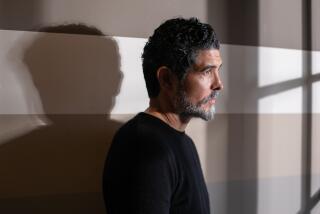Brutal Truths
- Share via
NEW YORK — The infant was so young he could not yet crawl. Caseworkers, such as the 22-year-old investigator summoned to examine the child for the U.S. Public Health Service, called these kids “arm babies,” meaning they could only be held in the arms of an adult. This particular arm baby had a venereal disease.
For Andrew Vacchs, “it was my first experience with rage as a result of child abuse.” Vacchs had faced appalling situations in his job tracking down sexually transmitted diseases. But an infant with VD and a parent who shrugged and said “so what” raised more rage in the idealistic young health-care worker than he knew he possessed.
For the record:
12:00 a.m. May 22, 1998 For the Record
Los Angeles Times Friday May 22, 1998 Home Edition Life & Style Part E Page 2 View Desk 1 inches; 13 words Type of Material: Correction
Novelist profile--In an article Tuesday, the name of author Andrew Vachss was misspelled.
Thirty-plus years later, that anger remains Vacchs’ lifeblood. It courses through him each time he encounters a child who has been beaten, raped, neglected or emotionally pummeled. It infuses his work as a lawyer for children. It throbs on every page of his best-selling novels.
“It is hate,” he said of the drive that fuels his work. “It is rage. Calling it a higher calling is a load of crap.”
Vacchs has produced a dozen novels since 1985, when “Flood” turned day-care center abuse and the proliferation of snuff films into a top-selling plot. The books have sold upward of a million copies, and have been translated into 17 languages. Vacchs is credited by his publisher with inventing the genre of “investigative fiction.”
“I get letters from the worst kind of perpetrators saying do I want to write a book with them,” Vacchs said. Sometimes the letters just spout off about how mad one of his books has made someone. Vacchs considers this a compliment.
“Flood” also marked the debut of Burke, a criminal who hires himself out as a private eye. Burke shares Vacchs’ short moral fuse, along with his antipathy for pedophiles, kiddie porn merchants and body parts salesmen.
In the just-published “Safe House” (Knopf), Burke is pitted against sexual victimizers who stalk their prey. As usual, it’s a topic that makes many book reviewers recoil. “What a crazy imagination,” one reviewer remarked--not recognizing, apparently, that the novels are thinly veiled reconstructions of what he sees every day as a lawyer.
“I wish it was fiction,” Vacchs said. “If you marble in the truth like fat on a great steak, they will swallow it.”
But often readers will accept in fiction the stories they would avoid in real life. His books are tough and jagged, just as he is. Wiry and acerbic, Vacchs probably eats fools for breakfast. The eye patch he wears is no affectation, but the remnant of a youthful encounter with the bad end of a chair. Currently, he also sports a splint on one hand. This accessory resulted from a recent demonstration he conducted in court. A baby he was representing had been smashed against a wall, leaving almost every bone broken. To illustrate the impact, he threw his hand against a wall. He would have been all right if he hadn’t hit a stud.
He is not the first to suggest that children are an under-protected constituency. But Vacchs stresses that even the most well-intentioned advocates can’t fully shield them from abuse and exploitation. “It takes a village to rape a child, too,” he said.
‘No Geneva Convention for Kids’
Vacchs’ crusade to stop child victimization stems from intense personal observation, but no firsthand experience. He was born 55 years ago on Charlton Street in Lower Manhattan. Although his father, a factory worker, was “an extraordinarily brutal man,” beaten horribly as a child by his mother’s boyfriend, young Andrew never so much as had his hand slapped.
But around the corner, at the home of any one of his best pals, the story was often different. “It is a personal experience when you sit next to your best friend and he is punched in the mouth and his face is shoved in the food,” Vacchs said. It was also no secret that children were sexually abused. “But not intrafamiliarly,” he said.
While still a teenager, he dropped out of school to get married--the first of three such alliances, all childless. He sped through college and realized he needed a job, instantly. The most adventurous position he could find was with the Public Health Service. “It seemed the most exciting,” he remembered, “to be an investigator and to be detached, which meant they let you go unsupervised.”
He was deployed to the Midwest, where some of his colleagues ended up knocking on doors in the suburbs. Vacchs “got to do the joints and the whorehouses.”
Vacchs went on to work as a social casework supervisor in New York and to direct programs for urban migrants in Chicago. He ran a reentry center for ex-convicts in Boston and headed a maximum security prison for youthful offenders in Massachusetts. He was also an American aid worker in the late ‘60s during the war in Biafra, “that wonderful exercise in human kindness.”
He says emotional abuse of young people is rampant, almost unquantifiably high. He is waging a war against such violations, nothing less: “Metaphor!” he said. “I’ve been in a war, and I don’t see the difference.”
Victimizers of children are the enemies of any so-called civilized society, Vacchs contends. As such, he has determined, they should be exterminated. His is a guerrilla war: “A kid in an abusive home has far less rights than a POW. There’s no Geneva Convention for kids.”
Also, the frontiers are unclear. The selling of 7-year-olds for sexual purposes in Thailand is no less heinous than the genital mutilation of young girls in Africa or sexual abuse of children in America.
“This is a human condition, not a cultural condition,” he argues. “Every country I have been to, the press says, oh, it doesn’t happen here. And of course it does.”
Making Enemies for Kids’ Sake
Vacchs grew restless while running the prison in Massachusetts. His outspoken impatience meant that he was constantly getting suspended. “I was sick and tired of going to court with kids and watching them get thrown away like they belonged in Hefty bags.”
He knew he needed new ammunition, so he signed up for night law school. When he graduated, he worked half-time as a lawyer for children and half-time doing criminal defense to finance the unpaid children’s work. He couldn’t afford an office, so he worked out of a Chinese restaurant in New York. When the pay phone rang, the owner would pick up and say, “Mr. Vacchs’ office.” In turn, Vacchs developed a thriving, if largely unpaying, clientele among Chinese immigrants.
In a manner of speaking, Vacchs has moved uptown. His law office is in Queens, equidistant from the family courts of Manhattan and Westchester County, where he does most of his representation. He occupies space in a funeral home complex--aside from quiet obscurity, 24-hour security was the primary benefit for an attorney-novelist who says he is regularly threatened with death or dismemberment. The two pit bulls that reside with Vacchs and his wife, Alice, a former assistant district attorney in Queens, also serve as a kind of canine insurance policy.
Like one of his own characters, he is often stalked--usually by people who wish he wouldn’t write about how pedophiles do their jobs. Many pedophiles dwell in Category III of his child-abuser classification system. “They are evil, and this is where I part company with the social workers,” he said. “There are people out there who hurt children for pleasure or profit or both.”
But most are what he calls “the inadequates, people who simply don’t know how to be parents.” They are too young, they are impaired by drugs or alcohol or poverty. “These people benefit immeasurably from what social workers like to call rehabilitative efforts,” he said. The final group, “people who are card-carrying crazy,” also may alter their behavior, provided they stick to their medication, “which they rarely do.”
The threat posed by all these people reflects what Vacchs calls “a devolution” of children. “We don’t protect our young,” he said, a claim few animals can make. “And we tolerate predators of our own species.”
In one breath, he hails efforts, such as Megan’s Law in New Jersey, to identify sexual offenders who move into a community. In the next, he rails against states that punish people when they rape a kid next door but not when they rape a kid in their own family.
Yet he rebuffs the suggestion that he lives in a world with little hope. “I save more kids’ lives than an emergency room surgeon,” he said. “I can personally snatch a kid from the jaws of hell.”
And when he talks about the good parts of his work, Vacchs softens--and even smiles. “I don’t understand people whose gratification is a BMW,” he said. “You don’t know what joy is until you see a kid who was tortured get adopted by a family. I’ll bet my job satisfaction rate is higher than anybody on Wall Street.”
More to Read
Sign up for our Book Club newsletter
Get the latest news, events and more from the Los Angeles Times Book Club, and help us get L.A. reading and talking.
You may occasionally receive promotional content from the Los Angeles Times.








